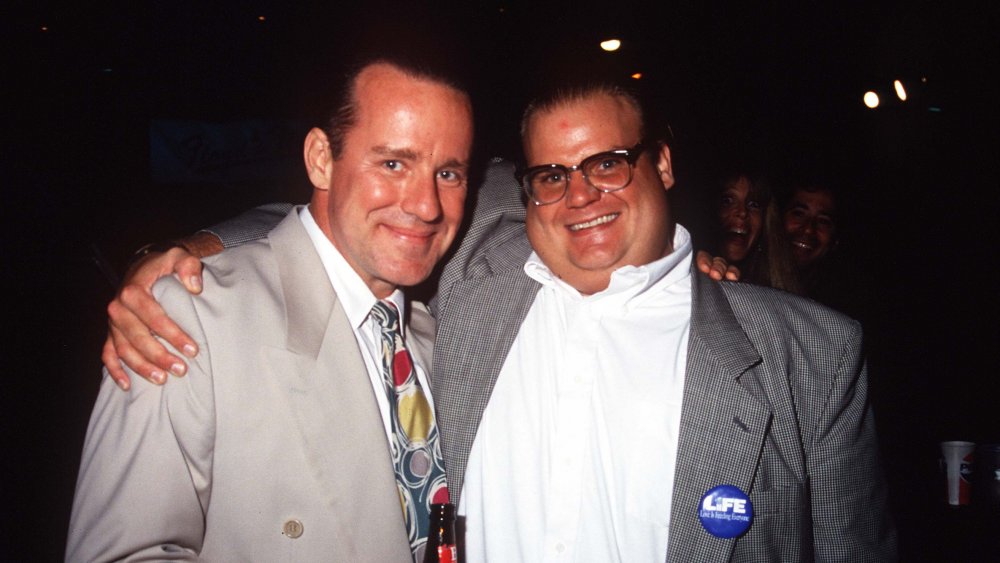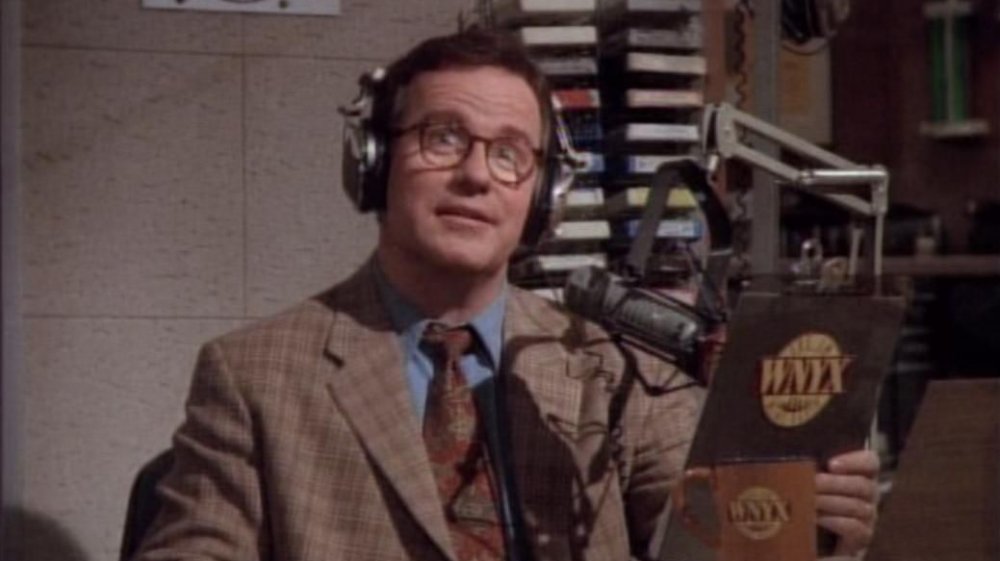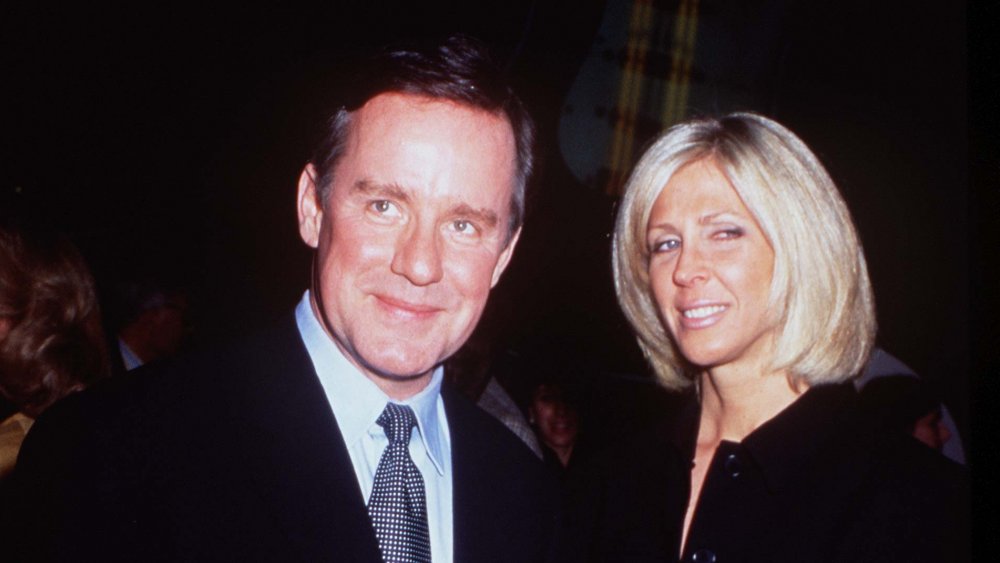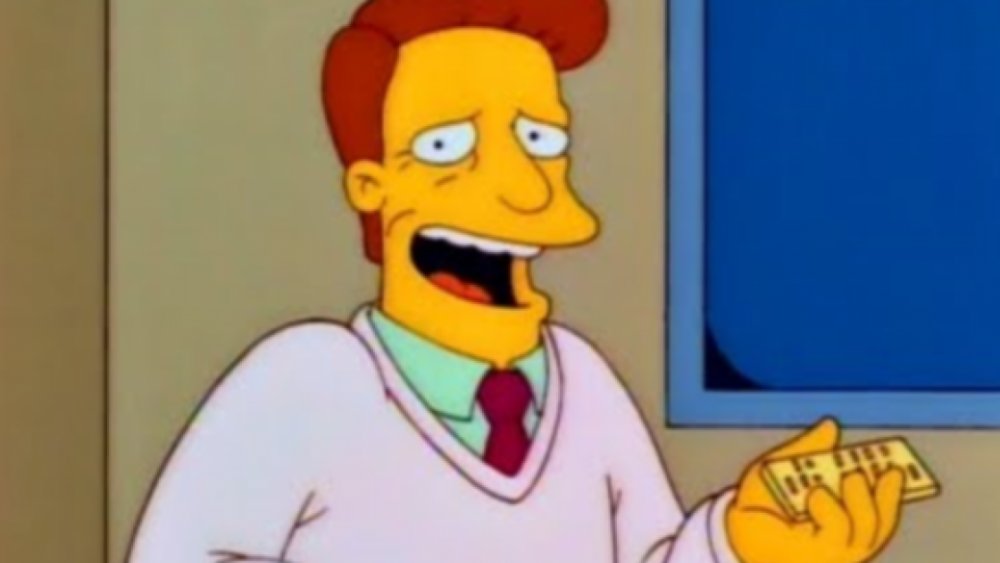What The Last 12 Months Of Phil Hartman's Life Were Like
1998 promised to be Phil Hartman's year. It was a slow ascent to household-name status for the deadpan comedian. Through the 80s and early 90s — from his time performing on Saturday Night Live and voicing unforgettable characters on The Simpsons like Lionel Hutz and Troy McClure – the stars seemed to be aligning for Hartman in '98. Those promises came to an explosive end in May of that same year when Hartman was shot by his wife, Brynn, in their California home. The murder-suicide rocked the industry to its very foundation, and many in Hollywood are still wondering why it had to happen. Hartman's death was the second half of a one-two punch within the comedy community, landing just after Chris Farley's passing six months prior. The violent death undercut his straight-laced everyman reputation, making the incident even more of a shock than it would have otherwise been.
In the years since, he's been immortalized in many ways; his Simpsons characters were retired, he received dedications in movies that were posthumously released, and he's been placed on both the American and Canadian Walks of Fame. It took a while, however, for the public to learn that the events leading to his death had a long trail of red flags behind them. Here's what the final months of Phil Hartman's too-short life looked like.
Phil Hartman was as busy as ever
Just a few weeks before his death, Hartman ended a long series of junkets promoting the film Small Soldiers, in which he had a starring role. The movie was released that July and included a dedication in the end credits. Small Soldiers was Hartman's highest-profile release of that year, but it wasn't the only one; he also had several voice credits forthcoming, including one for the role of Jiji in the English dub of Hayao Miyazaki's now-famous Kiki's Delivery Service.
By all accounts, Hartman was a workaholic. He'd been living a bi-coastal life for several years thanks to his time on SNL, and that travel-heavy lifestyle did not abate even after he departed as a cast member in 1994. Between 1997 and 1998, he had 8 major credits in various media projects (via IMDb) in addition to some lucrative commercial work.
He was also committed to the role of Bill McNeal on NewsRadio, and gave a few interviews lost to time about his place on the show and concerns about its continued existence. Though it was a critically-celebrated comedy, the show was a perpetual occupant of the so-called "bubble list" every May when networks traditionally announce their slate of renewals, pilots, and cancellations. NewsRadio was ultimately renewed for one more season, though Hartman did not live to see it. The premiere episode of that final season was dedicated to his character, wherein the writers chose to write him off via a sudden, off-screen heart attack.
Phil Hartman's family life had become unstable
When Hartman's murder occurred on May 28, 1998, it came as a shock to the world. Once that shock subsided, however, it became clear that the idyllic celebrity life he projected wasn't all that it seemed.
Brynn Hartman had a history of cocaine abuse (via People). She had been clean for a while, but at some point in 1997 she began using again; her extended family pressured her to enter rehab, but to no avail. The situation surrounding her mental health at the time was murky, complicated by her career issues, heavy drinking, and drug abuse. According to her brother — who later filed a lawsuit against Pfizer – the antidepressants she had been prescribed at the time may have been a contributing factor to her violent breakdown.
Some people close to the Hartman family have suggested that Brynn was jealous of her husband's celebrity – especially at a time when her own career was foundering. Others, more sympathetic to Brynn's plight, have claimed that she was wounded by Phil's extended absences and the emotional distance he'd been putting between them for years. Whatever the truth of the matter, there was obviously tension. This manifested in fights between them, which Phil would normally deescalate by retreating to bed and pretending he was asleep (via Hartford Courant).
The author of the biography You Might Remember Me: The Life and Times of Phil Hartman told Salon: "[Phil] stayed too long in the marriage. But he loved his kids intensely and he didn't want a third divorce to split the family apart. So that was a huge part of it. He also didn't want to be a three-time loser in marriage."
Hartman had big plans for the future
The greatest tragedy when anyone suffers a violent death is the question of what might have been. Phil Hartman didn't exactly have a short career — his comedy work stretched back to 1975 when he first joined the sketch troupe The Groundlings — but one is left with the sense that some higher peak of success had been in reach before his death.
At the time of his death, Hartman had been seeking to develop a live-action film centered on his Simpsons character Troy McClure, the washed-up D-list actor. Since the character usually introduced himself on the show by plugging past films and documentaries in which he appeared, it's possible that this idea may have included some kind of metatextual film in which McClure would have starred. Since the idea had only been pitched when Hartman passed, no script was ever produced, though his fellow Simpsons creative staff were very much behind the idea.
On top of that, Simpsons creator Matt Groening had been hard at work preparing Futurama for its eventual debut in 1999. Groening had intended the character Zapp Brannigan to be voiced by Hartman, which makes total sense now that we're familiar with the incompetent spaceship captain. The series concept pitch was finally given to Fox in April 1998 just weeks before Hartman's death, and the role ultimately went to Billy West when the first season's thirteen episodes were finally ordered by the network.
There is no replacing Phil Hartman. The fact that so many iconic characters had to be retired or reimagined in the wake of his death proves the extent of his legacy. He was undeniably a singular talent.



